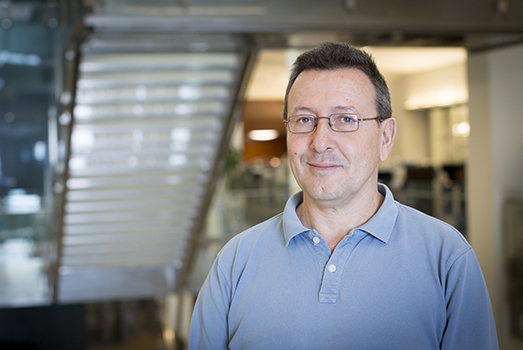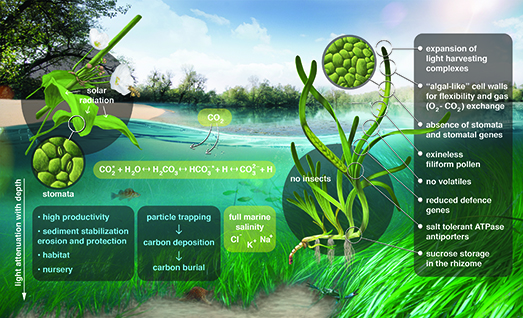Carlos Duarte's Eelgrass research published in Nature

Professor Carlos Duarte, the Tarek Ahmed Juffali Research Chair in Red Sea Ecology, on the KAUST campus.
Professor of Marine Science, Carlos M. Duarte, and a team of researchers have completely sequenced a seagrass genome that could be vital to our understanding of plant adaptation to growth in seawater and vulnerability to stresses, such as climate change. The team’s work was published in the journal Nature Wednesday, January 27, 2016.
Seagrasses are a small set of about 60 species of flowering plants that, early in the evolution of higher plants, have adapted to life in the ocean—once terrestrial species that have evolved to grow in full-strength salt water, and form some of the most productive and ecologically important ecosystems in the ocean. The seagrass under study, Zostera marina, lost a number of genes on its way into the ocean, as the interaction with insects and the role of compounds emitted to the atmosphere in signaling are lost in the sea. In turn, Z. marina evolved a number of mechanisms to resist salt, which might shed light on selective breeding techniques that could make food crops more salt tolerant.
"Seagrasses are a neglected group of higher plants, representing about one in every 5,000 species, but are of huge significance as they are the only marine plants that were able to fully colonize the sea," said Duarte.
Understanding the Z. marina genome, or Eelgrass as it is more commonly known, can help elucidate the vulnerabilities to the global stressors, such as climate change, that are leading to a rapid loss of seagrass ecosystems. And studies of the adaptive capacity of seagrasses might also help drive more effective conservation efforts to these threatened ecosystems.
"This has been a long, more than seven-year process. A large number of people were required to disentangle the evolutionary code contained in the genome of this marine plant," said Duarte.

A figure that was published as part of the Nature letter. By Ivan Gromicho.
The Nature letter, titled “The genome of the seagrass Zostera marina reveals angiosperm adaptation to the sea,” is the result of a research effort led by University of Groningen Professor of Marine Biology Jeanine Olsen. The highly international collaboration involved over 35 laboratories around the world including the Groningen Institute of Evolutionary Life Sciences (GELIFES), University of Groningen; the Red Sea Research Center, King Abdullah University of Science and Technology; the Department of Plant Biotechnology and Bioinformatics, Ghent University; and the Dipartimento di Scienze Agrarie e Ambientali, University of Udine to name a few.
About Carlos Duarte
Carlos M. Duarte is professor of marine science and the Tarek Ahmed Juffali Research Chair in Red Sea Ecology at King Abdullah University of Science and Technology (KAUST). His research focuses on understanding the impacts of global change in marine ecosystems, and addressing all components from microbes to megafauna.
Duarte was recently honored by the European Geosciences Union with the 2016 Vladimir Ivanovich Vernadsky Medal. Duarte can be contacted for comment at carlos.duarte@kaust.edu.sa.

